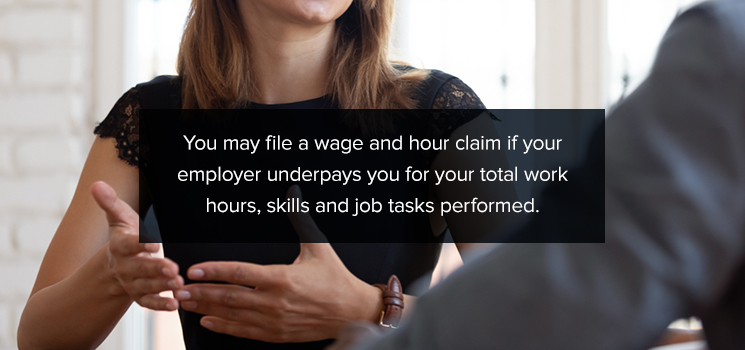Too often, employers and employees alike assume that unpaid wages are not worth suing over. However, even if the sum is relatively small, you deserve compensation for the hours you have worked. As a working Pennsylvanian, you should understand your wage rights and the state’s overtime laws relevant to your circumstances.
The U.S. Department of Labor’s Wage and Hour Division enforces wage and overtime pay standards via the Fair Labor Standards Act. At Weisberg Cummings, P.C., our lawyers can handle your employment law claim if you want to sue for unpaid wages.
Can I Sue My Employer for Not Paying Me Correctly?
Suing for unpaid wages is possible under the right circumstances. Let’s explore the circumstances under which you may sue for pay, not getting paid on time and withholding wages.
Can You Sue for Pay?
Yes, you can sue your employer when they do not pay you what they owe you. However, there may be some instances in which you cannot pursue a private lawsuit, such as:
- The statute of limitations has expired.
- The Secretary of Labor already filed a lawsuit to recover your unpaid wages.
- You receive back pay under the U.S. Department of Labor’s Wage and Hour Division.
Keep in mind that if you file a complaint under the Fair Labor Standards Act, your employer cannot discriminate against you or fire you for filing the complaint. Retaliation is illegal, and typical examples may include termination or getting passed over for a promotion.
Can I Sue If My Employer Is Withholding Pay?
Yes, you can sue if your employer is withholding pay. Employers need to pay employees their due wages on time. According to the Pennsylvania Wage Payment and Collection Law, your employer should pay your wages. If they fail to do so, your employer could face penalties like a civil lawsuit.
Most likely, your employment agreement outlines your wages and the frequency at which you should receive payments. If you have questions about a withheld payment, first review this agreement. If you are still unsure about some of the language contained in your employment agreement, contact an attorney who can offer clarification.
Even if you quit your job or your employer terminates your employment, they cannot withhold your pay. You should still receive your wages in full and on time, typically by your next usual payday.
Regardless of why you leave your job, you should receive your final paycheck for the wages you earned. Your employer should maintain careful records of the hours you worked and wages you earned so they can pay you in full. The only money an employer can legally withhold from your check includes pay for:
- Taxes
- Federal programs
- Bonds
- Thrift plans
- Welfare plans
- Stock options
- Benefits plans
- Pension plans
- Charitable contributions
- Labor organization costs
- Credit union or bank payments
Other than for taxes and federal programs, your employer must obtain your written permission to withhold some of your pay for any of these reasons.
Can I Sue for Not Getting Paid on Time?
If your employer does not pay you on time in Pennsylvania, you may sue your job for not paying you. Your employer should correct this issue as soon as possible. Otherwise, if your contract is terminated or you quit your job, your employer typically has until the next scheduled payday to pay your owed wages. This means you must wait until then before you contact a lawyer. In the meantime, it may help to enquire with your employer or the HR department.
Can I Sue My Employer for Underpaying Me?
You may file a wage and hour claim if your employer underpays you for your total work hours, skills and job tasks performed. In this situation, you may file a claim for different scenarios, such as overtime, minimum wage, unpaid reimbursements and illegal deductions. The statutes of limitations may vary depending on your specific claims, so it is important to act quickly.
Let’s say you have proof that a peer of a different gender, ethnicity or age group in the same job position receives a higher pay than you. In this situation, you may file a lawsuit to recover the amount of unpaid wages, or wage gap, and a penalty of twice the wage gap as damages. If you believe the underpayment was due to age, race or gender discrimination, you may additionally file for discrimination charges under the general anti-discrimination laws.
How to Sue for Unpaid Wages
You may follow these steps to receive more timely compensation from your employer.
1. Gather the Relevant Documentation
To prove your case, document and gather all relevant information about your tasks performed, working hours and wages received. You may also need to organize and maintain records of your bank statements, pay stubs, work contract, and communications with your employer, supervisor or HR personnel about your payment terms.
2. Consult With an Employment Law Attorney
You may then speak with a specialized employment law attorney to help you understand your rights and the next steps forward. Providing them with the documents you gathered can help them confirm whether you may have a case and how the process might go in your specific situation. This stage allows you to explore your available legal options and weigh the pros and cons of each.
3. File a Wage Claim or Lawsuit
Prior to suing your employer for underpaying you, you may choose to submit a claim through the U.S. Department of Labor’s Wage and Hour Division, which will investigate your claim. After the WHD decides your claim is valid, they will send your employer a legal order to pay what they owe you.
For wage violations, this is a common remedy, ensuring your employer pays the difference between what they owed you and what you got paid. This difference is back pay, and in some cases, it may be a requirement under the Fair Labor Standards Act. If this attempt does not remedy the situation, you may want to take your case to your local court or small claims court.
Wage and labor laws can be complex, and whether you can sue your employer or recover missing wages depends on several factors.
- You worked overtime hours.
- You work a traditional or non-traditional workweek.
- You get paid hourly or you are an exempt employee.
- You earn the state or federal minimum wage.
- The money was absent from your previous paycheck or may be on your next paycheck.
- There is currently a class-action lawsuit against your employer because other employees are missing wages or seeking back pay.
Consider each of these factors if you want to take the case to court. If you choose to work with an employment attorney, they will discuss these factors with you.
Why You Should Hire an Employment Law Attorney to Handle Your Wage and Hour Case
An excellent employment law attorney can let you know how to sue for unpaid wages and guide you through every step of the process. When you work with an attorney at Weisberg Cummings, P.C., we can offer you a new perspective on the case, along with honest and realistic insights on what you may be able to expect.
If you become involved in a wage and hour dispute, it may shake your confidence and you might be worried about retaliation at work or even unlawful termination. When you find yourself in this situation, you could start wondering whether pursuing your case is worthwhile or if you should accept your losses and move on. Fortunately, at Weisberg Cummings, we can confirm whether your employer has violated wage and hour laws, and this reassurance can be invaluable to you.
We can help you through this challenging and uncertain time. We’ll help you make a plan for your next steps, and we can let you know what your best options are. To successfully fight a wage and hour case, you deserve an experienced employment law attorney from Weisberg Cummings on your side.
Get a Free Consultation
You deserve an employment lawyer in Pennsylvania who has experience in assisting injured workers throughout the state in employment law matters. At Weisberg Cummings, P.C., we can provide you with thoughtful legal service personalized to your circumstances and needs. Our combined experience of more than 40 years will allow us to represent you in your wage and hour case.
We return emails and calls promptly and dedicate time to fully understanding your goals and situation. Let our firm guide you through every step of fighting for your wages. Contact us at Weisberg Cummings, P.C., for a free consultation with an experienced employment lawyer.



